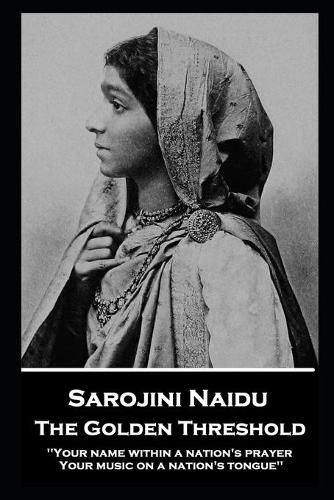Readings Newsletter
Become a Readings Member to make your shopping experience even easier.
Sign in or sign up for free!
You’re not far away from qualifying for FREE standard shipping within Australia
You’ve qualified for FREE standard shipping within Australia
The cart is loading…






Sarojini Chattopadhyay was born into a Bengali family in Hyderabad, India on February 13th, 1879. the eldest of the eight siblings. The family was well-respected in Hyderabad and were established artists. Naidu passed her matriculation examination at the University of Madras and took a four-year break from her studies.
In 1895, H.E.H. the Nizam’s Charitable Trust founded by the 6th Nizam, Mahbub Ali Khan, gave her the chance to study in England, first at King’s College, London and later at Girton College, Cambridge.
Even in these early times she was a social activist. It was whilst in England that she worked as a suffragist and was first drawn to the Indian National Congress’ Hindu movement for India’s independence from British Colonial rule.
Naidu became a part of the Indian nationalist movement and was a follower of Mahatma Gandhi and his idea of swaraj (this was an India without its colonial administration systems).
She began writing at the age of twelve. Her play, ‘Maher Muneer’, written in Persian, impressed the Nawab of Hyderabad. It was an auspicious start.
Sarojini met Paidipati Govindarajulu Naidu, a physician, and after finishing her studies at age 19 married him. The couple would have five children. Interestingly their families approved their marriage even though they were from different castes and society was not as tolerant as it might be today. Additionally, Sarojini was from Bengal and Naidu from Andhra Pradesh and marriages between those from the north and south were frowned upon. Happily, they overcame these problems and both marriage and careers thrived.
In 1905, her first collection of poems, ‘The Golden Threshold’ was published.
Despite her growing political career she still found time to write and published several further volumes of poetry. Such was her eloquence that she became known as the ‘Nightingale of India’.
Sarojini was appointed the President of the Indian National Congress in 1925 and was a major influence and figure in the Independence movement.
Along with several other Congress leaders including Gandhi and Jawaharlal Nehru she was arrested for taking part in the 1930 Salt March. Indeed Sarojini faced frequent arrest by the British Authorities and spent, in total, many months in prison.
Following India’s independence from British rule in 1947, Sarojini was appointed as the governor of the United Provinces (the present-day Uttar Pradesh) in so doing she became India’s first woman governor.
Returning from work in New Delhi on 15th February, 1949 she was advised to rest by her doctors, and her official engagements were cancelled. Her health deteriorated rapidly and on 1st March bloodletting was performed after she complained of severe headache.
Sarojini Naidu died of a cardiac arrest on 2nd March 1949.
$9.00 standard shipping within Australia
FREE standard shipping within Australia for orders over $100.00
Express & International shipping calculated at checkout
Sarojini Chattopadhyay was born into a Bengali family in Hyderabad, India on February 13th, 1879. the eldest of the eight siblings. The family was well-respected in Hyderabad and were established artists. Naidu passed her matriculation examination at the University of Madras and took a four-year break from her studies.
In 1895, H.E.H. the Nizam’s Charitable Trust founded by the 6th Nizam, Mahbub Ali Khan, gave her the chance to study in England, first at King’s College, London and later at Girton College, Cambridge.
Even in these early times she was a social activist. It was whilst in England that she worked as a suffragist and was first drawn to the Indian National Congress’ Hindu movement for India’s independence from British Colonial rule.
Naidu became a part of the Indian nationalist movement and was a follower of Mahatma Gandhi and his idea of swaraj (this was an India without its colonial administration systems).
She began writing at the age of twelve. Her play, ‘Maher Muneer’, written in Persian, impressed the Nawab of Hyderabad. It was an auspicious start.
Sarojini met Paidipati Govindarajulu Naidu, a physician, and after finishing her studies at age 19 married him. The couple would have five children. Interestingly their families approved their marriage even though they were from different castes and society was not as tolerant as it might be today. Additionally, Sarojini was from Bengal and Naidu from Andhra Pradesh and marriages between those from the north and south were frowned upon. Happily, they overcame these problems and both marriage and careers thrived.
In 1905, her first collection of poems, ‘The Golden Threshold’ was published.
Despite her growing political career she still found time to write and published several further volumes of poetry. Such was her eloquence that she became known as the ‘Nightingale of India’.
Sarojini was appointed the President of the Indian National Congress in 1925 and was a major influence and figure in the Independence movement.
Along with several other Congress leaders including Gandhi and Jawaharlal Nehru she was arrested for taking part in the 1930 Salt March. Indeed Sarojini faced frequent arrest by the British Authorities and spent, in total, many months in prison.
Following India’s independence from British rule in 1947, Sarojini was appointed as the governor of the United Provinces (the present-day Uttar Pradesh) in so doing she became India’s first woman governor.
Returning from work in New Delhi on 15th February, 1949 she was advised to rest by her doctors, and her official engagements were cancelled. Her health deteriorated rapidly and on 1st March bloodletting was performed after she complained of severe headache.
Sarojini Naidu died of a cardiac arrest on 2nd March 1949.